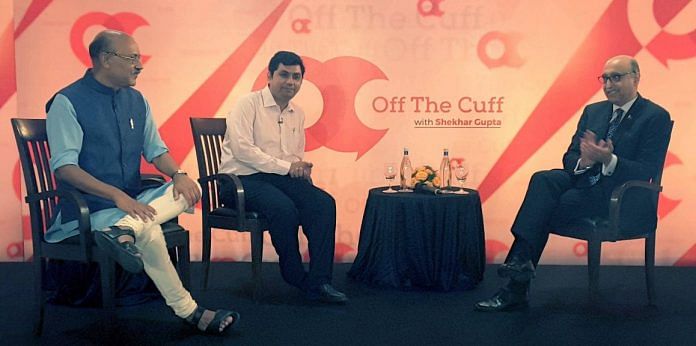At ‘Off The Cuff’, Abdul Basit says Pakistan’s stand is that talks need to be separated from terror, reiterates that Hizbul Mujahideen is “freedom fighting organization”
Hardening the stand on Kashmir and peace talks, the Pakistani High Commissioner to India has said that the window for engagement between the neighbours is getting narrower as both countries face elections in the next two years.
But Abdul Basit also said that Kashmiri militant group Hizbul Mujahideen is a “freedom fighting organisation” and that India should not link the dialogue process to terrorism – stated positions of Islamabad that are unlikely to make resumption of talks easy for New Delhi.
Basit was speaking at ThePrint’s ‘Off The Cuff’ in New Delhi Thursday evening.
The envoy, who is set to complete an eventful three-year tenure in India at the end of this month, was candid enough to admit that things back home in Pakistan were not “hunky dory” and that the nation was facing “9/11 on a daily basis”.
But on India-Pakistan he went back to the 2009 Sharm-el-Sheikh formulation, saying that talks cannot be held with preconditions and that Islamabad’s position is terrorism has to be delinked for meaningful progress. The UPA government had drawn strong criticism from the BJP for its position at, with senior leaders saying that “all the waters of seven seas will not wash the shame at Sharm-el-Sheikh”.
“After three years in India, I have concluded that talks and pre-conditions can’t go together. We need uninterrupted dialogue,” the envoy said. He referred to polls in Pakistan due next year and Indian elections due in 2019 to make the point that the window for engagement is getting narrower.
On being repeatedly asked on the Pakistani stand on Hizbul Mujahideen and the presence of its cadres in Pakistani territory, Basit said that it is seen as a freedom fighting organisation and that dialogue was necessary to resolve the differences in perception between the two nations on this. On a direct question whether fugitive crime lord Dawood Ibrahim was in Pakistan, Basit replied in the negative.
Speaking on the peace process in recent years, Basit said that a good start was made with PM Modi inviting his Pakistani counterpart Nawaz Sharif for the swearing in but “subsequent events didn’t help”. “ We were able to convince Sushma Swaraj to come in December 2015, then Pathankot happened and everything fell apart,” Basit said.
He added that a joint investigation team visited Pathankot but “we were unable to sustain cooperation”. The diplomat ruled out back-channel talks to resolve differences, saying that structured dialogue is first needed to start with.
Basit said that the stand on Kulbhushan Jadhav, who has been given the death penalty by a Pakistani military court on charges of espionage, remains the same and that consular access has been denied as he is “not an ordinary citizen”. Basit said that India has also denied Pakistan consular access to several prisoners, adding that the Pakistani decision on Jadhav will not change even if India changes its position.





What has India got that Pakistan should worry about?
Unless we have leverage, they, people like Bashit will continue with this rigid nonsensical stance